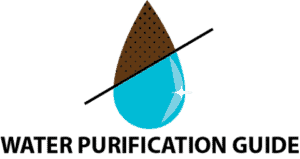According to the EPA, more than 1 million pounds of BPA is released into the environment each year that can make its way into your water supply. It’s more important than ever to remove the BPA from your drinking water to avoid the potential negative health impacts and filter pitchers may be an effective means.
Water filter pitchers with activated carbon or nanofiltration can effectively remove Bisphenol-A (BPA) from water. The water filter pitchers from leading water filtration brands including Epic, Clearly Filtered and Aquagear can efficiently remove more than 99.9% of BPA from water.
In this article, we’ll explain what BPA is, how it enters our water supply, its health impacts, water filter pitchers that can remove BPA from water, a list of the best water filter pitchers that can remove BPA, and where to buy a BPA water testing kit.
What is BPA (Bisphenol-A)?
Bisphenol-A, commonly called BPA, is a high production volume (HPV) chemical that is most commonly used in the production of epoxy resins and polycarbonate plastics. These plastics are then used to make various products such as thermal receipt paper, shatterproof windows, eye wears, epoxy resins, industrial equipment, sealants, automobile parts, and toys.
BPA is also called the “everywhere chemical” because it is literally present in so many of the items we use every day, including single-use plastic bottles and even our kitchen floors.
How BPA Enters Our Water
BPA can enter our water supply through three main mechanisms:
- Industrial effluents coming from the industries that manufacture BPA-containing products can mix up with the drinking water resources.
- The BPA penetrates the water table and enters our groundwater or drinking supply as a result of environmental pollution.
- BPA can also enter your water by leaching through plastic pipes or plumbing lines.
We can also be exposed to BPA when we drink from single-use plastic or reusable bottles that are made from BPA-containing plastics.
Water Purification Guide has a comprehensive list of BPA-free water bottles available here.
Health Impacts of BPA from Water
According to the National Health and Nutrition Examination Survey (NHANES III), conducted by the Centers for Disease Control and Prevention (CDC), BPA was detected in 93% of 2517 tested samples taken from people aged 6 years and above. The NHANES statistics from the CDC are regarded as being representative of exposures across the entire US.
BPA was detected in 93% of samples taken from people aged 6 years and above
Centers for Disease Control and Prevention
BPA is recognized as an endocrine disruptor. The endocrine system consists of glands that produce and secrete hormones in our body that regulate our metabolism, respiration, reproduction, growth, and development. Endocrine disruptors can imitate or interfere with the hormones produced by our body affecting our health negatively.
There are also concerns regarding BPA’s potential effects, specifically on children’s health. BPA is weakly estrogenic and has been reported to be a developmental, systemic, and reproductive, toxicant in animal studies.
A study even showed that BPA can affect the brain and behaviors, prostrate, and memory gland.
Tap water can be contaminated with BPA because BPA is not regulated, and water is not treated to remove it. The best option to remove it from your drinking water is to use water filter pitchers or other home-use water filters.
Types of Filters that can Remove BPA from Water
Here are the types of filters effective in removing BPA from water.
Activated Carbon Filter
Water filter pitchers with activated carbon are highly efficient in removing BPA. The activated carbon filter is a highly porous substance often made of coconut shells that removes water contaminants via adsorption.
When water passes through activated carbon filter, the BPA molecules get trapped inside the porous structure of carbon. Water filters with activated carbon can remove 99% of BPA traces from drinking water.
Nanofiltration
Nanofiltration membranes can efficiently remove BPA. These nanofiltration filters or membranes have a pore size of 0.01 microns that traps the BPA molecules, which typically range in size from 2.10 to 7.0 µm. Nanofiltration can remove 99.9% of BPA from water depending upon the type of membrane, filter, and operating conditions.
Nanofiltration works best at high pressure, and is less commonly used than activated carbon in water filter pitchers.
BPA: What it Means to have NSF Water Filter Certification
The National Sanitation Foundation (NSF) develops standards and provides guidelines for manufacturers to follow when developing their consumer goods. This organization aims to ensure the best possible levels of environmental and public health safety.
Water filters that carry NSF certifications mean that they are conscious of authenticating the contaminants their products can remove. Meanwhile, the lack of NSF certification doesn’t necessarily mean that the particular filter is incapable of removing claimed contaminants from water, as many brands opt for independent lab testing.
NSF 401 Certification
This standard focuses on the capacity of water treatment to remove up to 15 contaminants that are established by research as drinking water impurities. Some of these chemical contaminants include pesticides, herbicides, over-the-counter medications, drugs, BPA, and other chemical compounds.
The pollutants listed by NSF/ANSI 401 have been found in drinking water supplies at very low concentrations and may have an impact on how certain customers perceive the quality of their drinking water.
The NSF 401 certification implies to both point-of-use and point-of-entry water systems. Unregulated contaminants, material safety, and structural integrity of water filters are all mentioned in the standard.
This means that water filter pitchers with NSF 401 certification have been tested and confirmed to remove BPA from water.
The Best Water Filter Pitchers for Removing BPA
Here’s a list of the best water filter pitchers for removing BPA from water. You can click on the embedded links and it will redirect you to amazon or the brand’s original website where you can check the availability and latest prices.
1. Clearly Filtered Water Pitcher with Affinity Filtration Technology
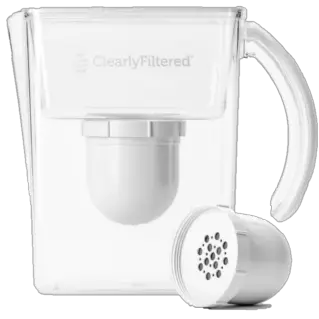
The Clearly Filtered® Water Pitcher with Affinity® Filtration Technology can effectively remove Bisphenol-A (BPA) with a >99.9% removal rate.
This pitcher uses 3 stages of filtration, including a woven mesh, granular activated coconut carbon and a composite shell made up of 7 proprietary filtration materials to effectively remove BPA from water.
This advanced technology helps the filter to remove up to 99.9% of more than 365 water contaminants including Fluoride, BPA, Lead, Glyphosate, and PFOAs.
This model is tested against numerous NSF standards including 401, 42 (chlorine), 53 (VOC’s and heavy metals), P231 (microbes) and P473 (PFAS).
The Clearly Filtered water filter pitcher is made using BPA/BPS free food grade Tritan materials. This makes sure it won’t release any odors or undesirable taste into your filtered water.
With its intelligent technology, the Clearly Filtered water pitcher doesn’t remove beneficial minerals and tends to retain them.
One bonus is the built-in water dam inside the upper reservoir also prevents unfiltered water from oozing out.
Pros
- Simple and slim design
- Long filter life (100 gallons)
- Filter needs replacement after 4 months
- Large capacity (10 cups)
- Easy-Grip Handle
2. Epic Nano water Filter Pitcher
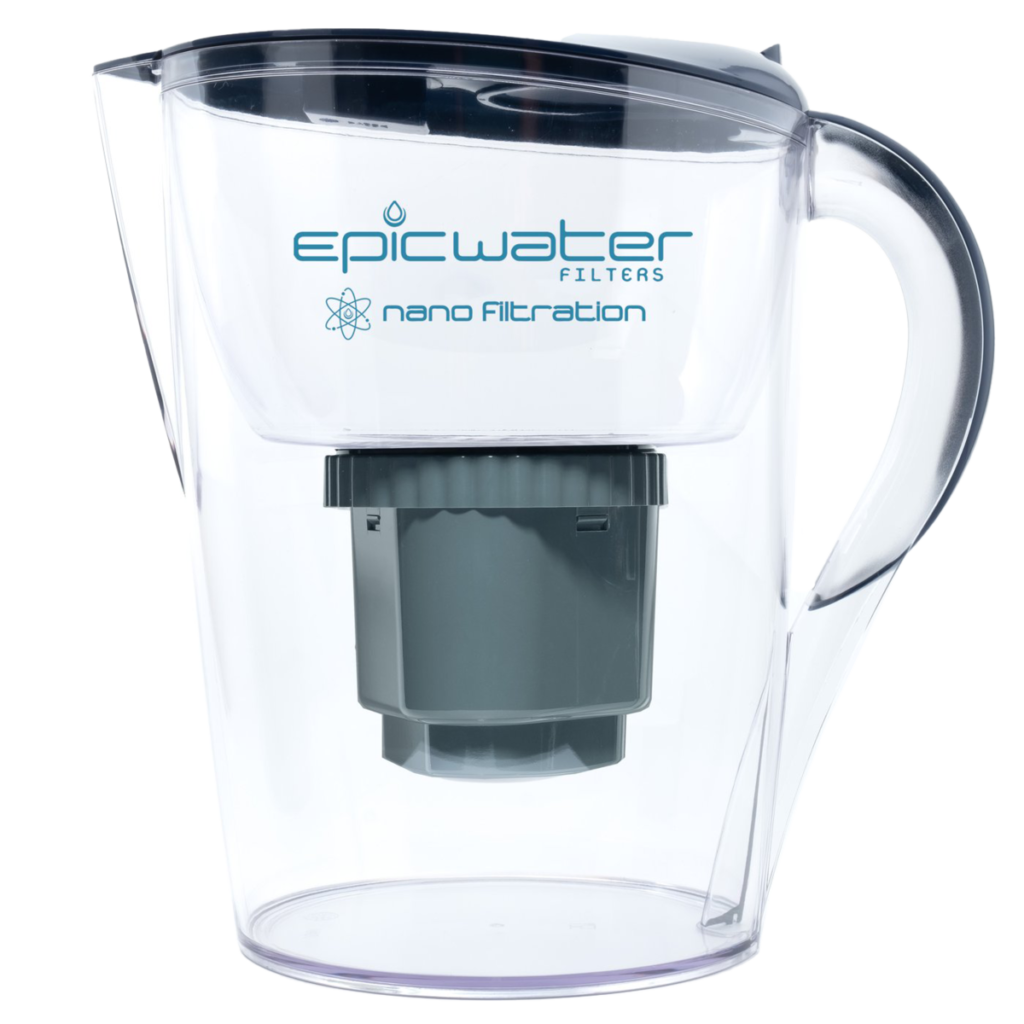
The Epic water nano filter pitcher is one of the most powerful water filters that can remove more than 99% of BPA from water.
With its sub-micron nano filter, this high-efficiency filter is tested in multiple labs to remove 99.9% of more than 200 tap water contaminants from heavy metals to fluoride, chlorine, Lead, bacteria viruses, and cysts
These US-made filters are tested against NSF/ANSI Standards 401 as well as 42 (chlorine), 53 (VOC’s and heavy metals), P231 (microbes) and P473 (PFAS). A filter life countdown timer is built in the lid of the pitcher that counts down from ninety days reminding you to change the filter.
The Epic Pure nano water filter pitcher is also made from BPA/BPS free materials so you have no concerns regarding alteration of your genetic makeup on using this product for drinking water.
Pros
- Stylish and space-efficient design
- Filters 150 gallons of water
- Long-lasting filter (3 to 4 months on normal use, 4-6 months on light, and 2-3 months on heavy usage)
- 100% recyclable
- Large capacity (51 oz upper reservoir and 68oz lower reservoir)
3. Epic Pure Water Filter
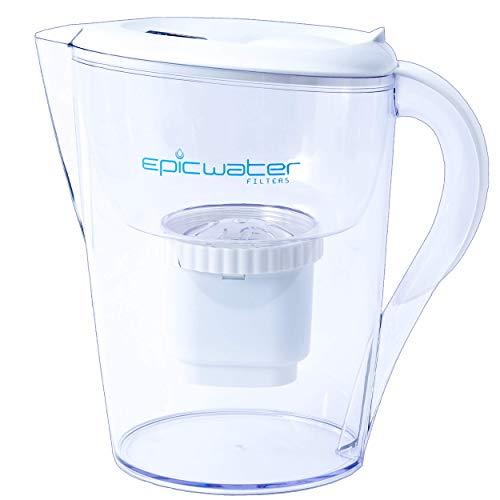
The Epic pure water filter pitcher features a solid carbon block filter instead of granular carbon for the efficient removal of more than 99% of BPA. This filter is designed to remove 99.9% of water contaminants including benzene, fluoride, chlorine, mercury, lead, PFOA, and microplastics.
This model is independently tested and certified across the globe to remove almost all known water contaminants. They are also tested against NSF/ANSI Standards 42, 53, 401, & P473.
Some other prominent features of this product are an LED filter life countdown timer and BPA/BPS free manufacturing material.
You need to replace the filter three to four times a year for purified water all year and serving as an alternative to more than 1500 plastic bottles that go into landfills.
Pros
- Elegant design
- Great purifying capacity (150 gallons)
- Long-lasting filter (2 to 6 months depending upon the frequency of use)
- Fully recyclable
- Large capacity (51oz upper reservoir and 68 oz lower reservoir)
4. PUR PLUS Pitcher
The Pur PLUS water filter pitcher comes with a powerful filter for removing 99% of BPA from water.
This model can effectively remove heavy metals, Total Trihalomethanes (TTHMs), chlorine, Benzene, Ethylbenzene, Atrazine, Nonylphenol, and other pharmaceuticals.
This high-capacity water filter is made of BPA-free materials. One of the unique features of the PUR PLUS water filter pitcher is its lockable lid that allows you to pour water while the water is getting filtered preventing spillage.
The filter change light displays filter status for simple monitoring and notifies you when it’s time to replace the filter.
This NSF-certified filter can efficiently purify water to provide you with great-tasting clean water.
Pros
- Space efficient design that can easily fit your fridge
- 40 gallons of filter life
- Filter needs replacement after 2 months
- Large capacity (11 cups)
- Dishwasher safe
- Easy to fill
5. Aquagear Filter Pitcher
The Aquagear filter pitcher features a carbon block filter made from high-quality carbon derived from coconut shells to remove 99.9% of BPA through adsorption.
This US-made water filter combines ion exchange and carbon media to protect people from a wider range of tap water contaminants including PFOS, PFOA, chlorine, copper, lead, asbestos, etc.
This high-efficiency filter pitcher is tested against NSF 42,53, 401, and p473. With an intelligent technology, this BPA free water filter pitcher retains healthy minerals while removing almost all of the water contaminants.
All of the pitchers and filters made by Aquagear are recyclable. Simply package up your used filter and send it back to Aquagear, and they will ensure proper material recycling. They even provide you with postage-paid labels.
Pros
- Elegant design
- Large water filtration capacity (120 gallons)
- Large water pitcher capacity (10 cups)
- 100% recyclable
- Fully vegan
6. Lifestraw HOME Water Filter Pitcher
The Lifestraw home water filter pitcher is NSF/ANSI 401 certified to remove 91.1% of Bisphenol-A(BPA) from water.
With a membrane microfilter and carbon filter, this water pitcher can remove 99.9% of microplastics, PFAS, chlorine, pesticides, herbicides, and even microbes.
This high-efficiency model is extensively tested and certified against NSF 42, 53, P231, and P473 standards.
The Lifestraw water filter pitcher is made of BPS-free materials and can filter 246 gallons of water per year.
Pros
- Sleek and sustainable design
- Long-lasting filters (membrane microfilter- 246 gallons, Carbon and ion exchange filter- 40 gallons)
- Large capacity pitcher (7 cups)
- Easy-fill lid
7. Zerowater Ready Pour Water Filter Pitcher
The Zerowater filter pitcher can remove 80% of BPA from water.
This five-stage filtration pitcher can remove 99.6% of total dissolved solids including but not limited to copper, iron, barium, mercury, lead, asbestos, chlorine, and fluoride.
With NSF/ANSI 42 and 53 certification, this water filter pitcher can be a great choice for fresh and pure drinking water. You can dispense filtered water while the reservoir is still filtering thanks to the Ready-PourTM technology.
Every 5-stage water pitcher is based on BPA-free materials and comes with a TDS meter so that you can check quickly check the quality of your water before and after filtration.
Pros
- Aesthetically pleasing design
- Large capacity (10 cups)
- Comfort-grip handle
- 20 gallons filter lifespan
- Alternative to 150 single-use water bottles per filter
Why is it Difficult to filter BPA from the Water Supply?
The EPA developed a rule that advocated regulating the use of granular activated carbon in drinking water treatment facilities during the early stages of implementing the Safe Drinking Water Act in the US in 1974. The commencement of this rule would require the water treatment facilities across US to use GAC in their water treatment centres for complete removal (99.9%) of BPA from water and ultimately the public water supply would be BPA-free.
The so-called GAC rule was fiercely opposed by the water supply sector across the US due to its high cost, notably by the biggest water utilities in California. Consequently, the agency opted to disregard the rule.
Since 2011, several states have approved legislation limiting the use of BPA in single-use or reusable food containers. However, this occasionally applies to water bottles. There is no effective enforcement mechanism to force water bottle manufacturing companies to switch from BPA to safer chemicals.
Your tap water can still be contaminated with BPA because BPA is not regulated, and water is not treated to remove it. Therefore, the best option to remove BPA from your drinking water is to use water filter pitchers or other home-use water filters.
What Are The Safe Levels of BPA in Water
The Minnesota Department of Health considers 20 ppb to be the acceptable threshold of BPA, which means that a person consuming water at or below this level would face little to no risk of BPA-related health impacts.
Can you Test your Water for BPA?
Drinking water can be tested for BPA by sending it to an authentic and reliable testing lab.
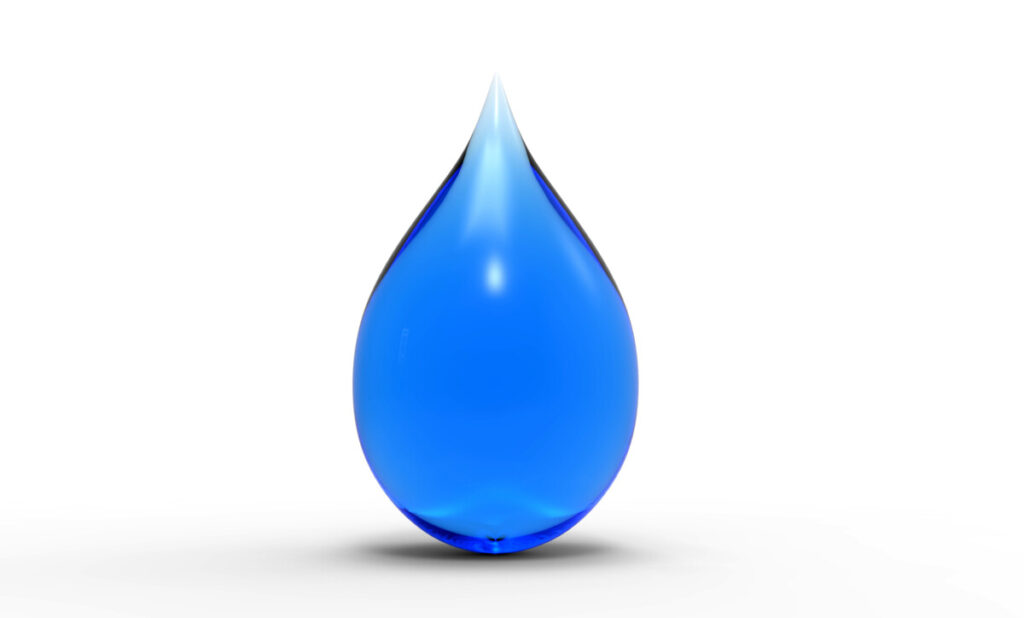
My tap score is one highly efficient lab testing services that offer specialized BPA compound water tests for targeted analysis of bisphenol A (BPA) and bisphenol F (BPF) in drinking water.
This test can also detect the presence of Bis(2-hydroxyphenyl)methane, Bisphenol A diglycideryl ether, Bisphenol A diglycidyl ether, Bisphenol F diglycideryl ether, and Bisphenol F diglycidyl ether in water.
- Order today and they’ll send you everything you need (collection bottles, vials, or tubes) to collect and send the water sample, including a guide with detailed instructions on how to collect and pack the water sample safely.
- Send back your samples for swift, independent, and certified testing.
- Within 12 days, Tap Score analyses your water sample and sends you a complete report regarding the quality of your water along with potential filtration options.
For more information and to order your BPA compound water testing kit click here.
Does Tap Water have BPA?
According to the US Environmental Protection Agency (EPA), BPA levels in US drinking water are usually under 1 part per billion (ppb).
However, a study reports that larger urban areas where the production, distribution, and usage of epoxy resins and polycarbonate plastics are prevalent have high amounts of BPA in the environment.
This means that it is highly likely that BPA seeps down to the drinking water sources that ultimately come as tap water in your home.
